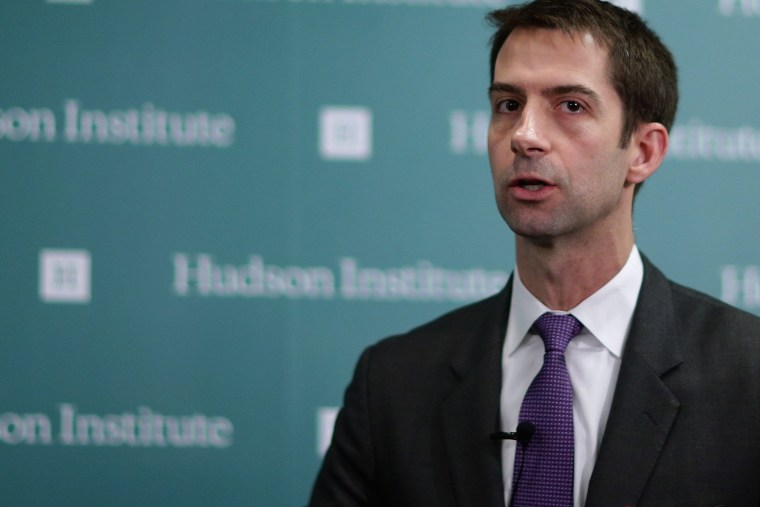Much of the far-right is unmistakably excited about Mike Pompeo's nomination to be the next secretary of state, and as the CIA director is poised to face a historic rejection from the Senate Foreign Relations Committee, plenty of conservatives are trying to keep the pressure on Pompeo's skeptics.
Some, however, have less credibility than others.
Sen. Tom Cotton, R-Ark., who has been among Pompeo’s most vocal champions in the Senate, lambasted his colleagues ahead of voting.“Democrats, especially on the Foreign Relations Committee, are really engaged in shameful political behavior,” Cotton said Sunday on CBS’ “Face the Nation.”
Oh, I see. Tom Cotton wants to have a conversation about "shameful political behavior" on the part of senators who aren't on board with a presidential nomination.
As luck would have it, that's a great idea. Let's have that conversation and start with how he treated Cassandra Butts.
As regular readers may recall, in 2016, the New York Times’ Frank Bruni highlighted Cassandra Butts’ nomination to serve as the United States ambassador to the Bahamas.
After “decades of government and nonprofit work that reflected a passion for public service,” Butts received a nomination from Barack Obama to a diplomatic post for which she was well qualified. Her confirmation should’ve been easy, but the Senate kept putting her nomination on the back-burner – Sen. Ted Cruz (R-Texas), for example, blocked her as part of a tantrum against the Iran nuclear deal.
And then there was Tom Cotton, who blocked Butts and two other nominees.
Cotton eventually released the two other holds, but not the one on Butts. She told me that she once went to see him about it, and he explained that he knew that she was a close friend of Obama’s – the two first encountered each other on a line for financial-aid forms at Harvard Law School, where they were classmates – and that blocking her was a way to inflict special pain on the president.
Bruni’s report added that Cotton’s spokesperson “did not dispute Butts’s characterization of that meeting.”
All of this became even more notable when Butts died at the age of 50 of acute leukemia, which she didn’t know she had until her life was nearly over. She waited 835 days for the Senate to vote on her nomination, but the vote never came.
“All Cassandra wanted to do was serve her country,” Valerie Jarrett, a senior adviser to the president, told the Times. “Looking back, it is devastating to think that through no fault of her own, she spent the last 835 days of her life waiting for confirmation.”
As we discussed at the time, this story got me thinking about the nature of public service, and how different people approach their responsibilities.
On the one hand, we see Cassandra Butts, who could have used her Ivy League education to go into the private sector and make a lot of money, but who chose instead to serve the public, working on Capitol Hill, the White House counsel’s office, and various non-profit organizations, including the NAACP’s Legal Defense and Educational Fund.
On the other hand, we see Tom Cotton, who thought it was responsible to use his Senate office to block Butts, not because of the merits of her nomination, because he wanted “inflict special pain on the president.” If that meant seeing Butts as little more than a pawn on a chessboard, so be it.
Both Butts and Cotton went to Harvard, and both chose careers in the public sector, even when the private sector would have been more lucrative. Indeed, though Cotton’s congressional career has been brief, he also had an impressive military career before entering politics, serving honorably in Iraq and Afghanistan.
At some point, however, Cotton convinced himself that using his office to “inflict special pain on the president,” rather than doing the right thing, was acceptable. The GOP politician came to the conclusion that treating a qualified nominee – a human being – this way was justifiable as part of a petty, partisan tantrum against a president he held in contempt.
And now Cotton, seemingly comfortable giving lectures from his high horse, wants to point the finger at senators' "shameful political behavior." Maybe the Arkansan has forgotten how he treated Cassandra Butts. Perhaps now is a good time to remind him.
